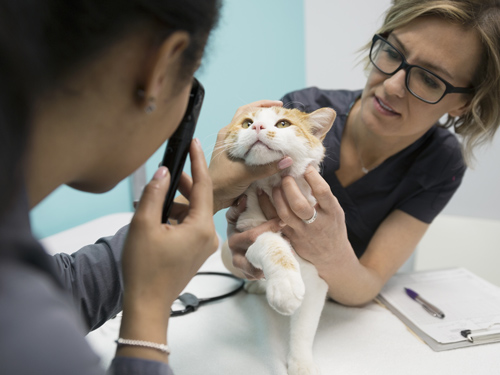
Buying a cat? Check out these 9 top tips
Welcoming a kitten or older cat into your home is a big responsibility. Check out our helpful guide and find out everything you need to know before bringing your new cat home.
Published:11 July 2018
1. Stock up on cat essentials
To make sure your cat is happy and comfortable, there are a few important supplies you’ll need to pick up:
- Bowls for food and water: stainless steel and ceramic bowls are easier to keep fresh and clean than plastic ones. Make sure you have separate bowls for food and water.
- A litter box and some cat litter: you may have to experiment with a few different brands before you find one your cat likes.
- A soft and comfortable bed you can put in a warm part of your home or somewhere higher up to give your curious cat a good view of their surroundings.
- A pet carrier for taking your cat to the vet.
- A collar with an identification tag in case they get lost. You could also get one with a bell to help scare off prey if your cat’s a natural hunter.
- A variety of cat toys, such as feather teasers and scratchers to keep them from getting bored.
2. Add cat food to your weekly shop
Cat food is a top priority and will soon become a regular part of your weekly shop. Your cat’s diet should be chosen based on their age, breed, their general health and whether they’re going to be staying indoors or venturing outside. It’s worth asking your vet for their recommendation on how many meals your cat should eat a day, and what type of food is best for them.
The odd cat treat is ok too but remember not to overdo it. Over-feeding could be bad for your cat’s health.
3. Book in essential cat care
When you get a new cat, it’s important to get them checked over at the vet, and to also schedule any vaccinations they need.
Essential vaccinations raise your cats immune system against the feline herpes virus (FHV-1) and feline calicivirus (FCV) - the two main causes of cat flu. They’ll also protect against the feline panleukopenia virus, which causes feline infectious enteritis, and feline parvovirus (FPV).
Vaccinations are normally done at nine and 12 weeks for kittens, with a booster 12 months later and annual vaccinations going forward. You may also want to talk to your vet about having your cat neutered or spayed if they are going outside.

4. Work out an exercise routine
While cats love to spend a lot of time sleeping, they do need opportunities to exercise too – especially if they’re indoor cats. Laser pointers or toys tied to wands are great ways to have fun together while ping pong balls or wind-up mice are good fun too. Always supervise your cat while it plays with its toys.
A multi-level cat tower with treats hidden at different spots can encourage exploration too, and it’ll give your cat a nice view of their new home.
Some cat breeds need more exercise and stimulation than others. You can get an idea of how much exercise your cat needs by checking out our pet breeds guide.
5. Introducing cats to new friends
You should introduce your kitten to other people as early as possible to help them develop good social skills. Invite friends round to your home and let your cat approach them in their own time.
6. Buy a scratching post
Another great way for cats to exercise and work their muscles is by scratching - and if you buy them a post to do it on, you’re likely to save your furniture and wallpaper from getting shredded.
Be sure to choose a post that’s tall enough to allow your cat to stretch out fully, and they should take to it over time.
7. Training your cat
It’s not just dogs who benefit from some training. By using treats to reward your cat for good behaviour, they should start to understand your house rules.
8. Organise regular worming and flea treatments
Worms and fleas can be a problem for cats of all ages, and the best way to protect your pet is to book in regular vet treatments.
To protect your cat from the health problems caused by parasites, arrange worming and flea treatments every three months or so for adult cats. Kittens will need treatment monthly until they’re around six months old.
While routine worming and flea treatments aren’t normally covered by pet insurance, your vet might offer a monthly payment plan to cover the cost.
Another little help: There are some important vet visits that are covered by pet insurance. You can compare our different types of pet insurance to see what is and isn’t covered.
9. Set aside time for grooming
Cats are very good at keeping themselves well groomed, but they might need a hand sometimes. It’s best to start grooming at a young age so they can get used to the routine early. Here’s some steps to think about:
- Brush your cat’s coat once or twice a week.
- Brush your cat’s teeth once a day, or at least twice a week if that’s too tricky.
- Check your cat’s ears once a week and gently clean if needed.
- Only bathe your cat if they have fallen in something sticky or are exceptionally dirty.
Enjoy quality time with your cat
We hope this guide has given you some handy hints for making your new cat feel welcome and settled. Now you know the basics, it’s time to have some fun with your new best friend.

Important information
The content on this page aims to offer an informative introduction to the subject matter but does not constitute expert financial advice specific to your own situation. All facts and figures were correct at time of publication and were compiled using a range of sources.
